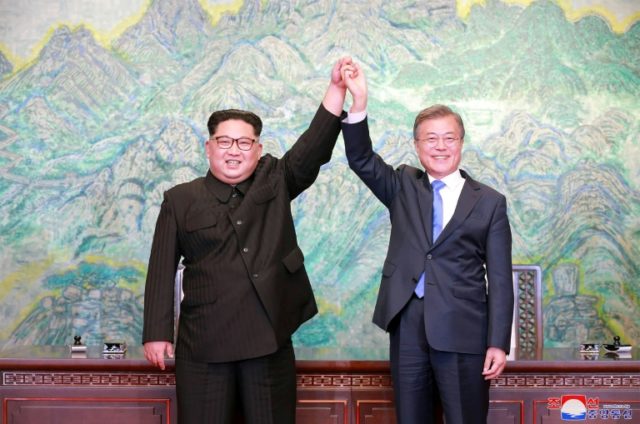Tokyo (AFP) – East Asia’s major powers meet in Tokyo on Wednesday to search for common ground on North Korea, while Washington’s top diplomat was also expected in Pyongyang, as a breakneck diplomatic dance gathers pace.
With the focus on the North exposing differences among its neighbours, the leaders of Japan, South Korea and China will be seeking a lowest-common-denominator agreement in the wake of a historic summit last week between Kim Jong Un and Moon Jae-in.
After years of isolation and sanctions prompted by its missile and nuclear programme, Pyongyang’s relationship with the outside world has rapidly warmed, to the point where Kim could meet US President Donald Trump over the next few weeks.
Trump announced late Tuesday that US Secretary of State Mike Pompeo was on his way to Pyongyang for talks ahead of the planned summit.
“We think relationships are building with North Korea. We will see how it all works out. Maybe it won’t. But it can be a great thing for North Korea, South Korea and the entire world,” Trump said in a televised address from the White House.
Pompeo, who met Kim in Pyongyang about a month ago while still director of the CIA, left Washington on Monday night with a delegation of senior officials, bound first for Japan, then North Korea.
Earlier Tuesday, Kim held talks with China’s Xi Jinping — their second meeting in six weeks — in which the North’s leader reiterated a commitment to denuclearization.
Kim’s unannounced trip to the northeastern Chinese port city of Dalian highlights efforts by the Cold War-era allies to mend relations that cooled as Beijing supported UN sanctions over Pyongyang’s nuclear and ballistic missile programs.
Beijing, long the North’s sole ally and economic buttress, has appeared eager to remain a key player in negotiations over Pyongyang’s weapons programme.
In comments published on North Korea’s official KCNA news agency, Kim said “he would advance hand in hand with the close Chinese comrades in the long historic course of achieving peace and prosperity in the Korean peninsula”.
– Denuclearisation debated –
Japan, which has by far the most hardline position of the North’s neighbours, has been left watching from the sidelines, uneasy at the pace of events and at what it sees as an unwarranted softening towards Pyongyang.
In announcing the three-way summit, Japanese Prime Minister Shinzo Abe said he hoped to “thoroughly discuss how we can have North Korea walk on a right path, resolve the abduction, missile and nuclear issues and create a bright future.”
The historical kidnapping of at least a dozen citizens by North Korean spies remains an emotive issue in Japan.
Abe is likely to push for continued pressure on Pyongyang, including for “complete, verifiable and irreversible denuclearisation”, Japanese media have reported.
South Korea’s President Moon, however, is expected to bat away such demands.
An official in his office last week said Seoul wanted the three countries to simply endorse the Panmunjon Declaration signed by Kim and Moon last month in the Demilitarized Zone that separates the two Koreas.
In an interview with Japan’s Yomiuri Shimbun published Tuesday, Moon said he hoped for “Japan’s active support and cooperation on the future road toward the settlement of permanent peace on the peninsula, as well as for the success of the US-North Korea summit meeting.”
China has welcomed the Panmunjon Declaration and pledged its support for a formal end to the state of war that persists on the Korean peninsula.
That all leaves the leaders — which includes Chinese Premier Li Keqiang — looking for a formula that no one can take issue with.
“Japan may simply say that it wouldn’t be prudent to just get all excited and automatically lift sanctions,” said Hajime Izumi, expert on northeast Asia and North Korea at Tokyo International University.
“China and South Korea won’t be able to voice outright disagreement with that.”
Despite huge and important trading relationships, ties in Northeast Asia have long been fraught, weighed down by historical grievances and squabbles over territory.
Moon’s visit will be the first by a South Korean president to Japan in over six years, with Li the first Chinese premier to visit in nearly eight years.

COMMENTS
Please let us know if you're having issues with commenting.